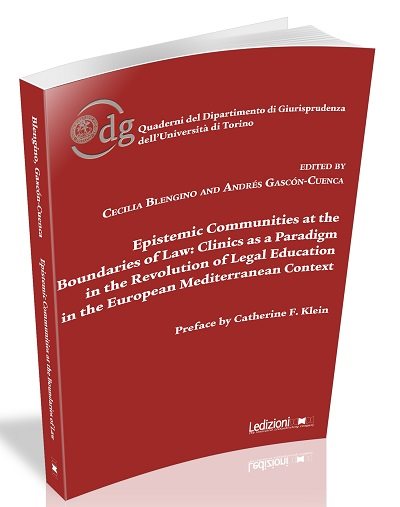
Professor Catherine Klein wrote the preface for a new book, Epistemic Communities at the Boundaries of Law: Clinics as a Paradigm in the Revolution of Legal Education in the European Mediterranean Context, on the development of clinics in Italy and Spain. Klein has collaborated with clinics in both countries: conducting training at their schools, collaborating on joint workshops, planning projects and conferences together, and more.
Professor Klein had this to say, "I have been working closely with law professors from Spain and Italy since 2010, where we first met at a legal education conference in the UK. Since then, we have organized international legal education conferences; designed and co-presented workshops that we have presented at their universities; and at legal education conferences elsewhere. The most recent was in Bratislava, where there is a thriving clinical movement thanks in part to the work that Leah Wortham and I did in Poland, starting in 1996.
Below is an excerpt form the preface:
Introduction:
I begin with a few quotes from two of the educational theorists I keep close to my heart.
- “There's no such thing as neutral education. Education either functions as an instrument to bring about conformity or freedom.”
― Paulo Freire, Pedagogy of the Oppressed - “Liberation is a praxis: the action and reflection of men and women upon their world in order to transform it.”
― Paulo Freire, Pedagogy of the Oppressed - “Give the pupils something to do, not something to learn; and the doing is of such a nature as to demand thinking; learning naturally results.”
― John Dewey, Democracy and Education - “If we teach today’s students as we taught yesterday’s, we rob them of tomorrow.”
― John Dewey, Democracy and Education
For a long time, educational theorists such as Paulo Freire and John Dewey have been telling us that engaging learners in real problems in the real world is the best way to stimulate and enhance learning. Clinical legal education is a movement that first ignited in the United States forty-five years ago, and has been incrementally taking hold in Europe and the rest of the world. Clinics are in part a response to theorists like Freire and Dewey, and others, who have urged us to rethink radically the goals and methods of education, and to re-envision the role that our universities play in our societies.
. . .
